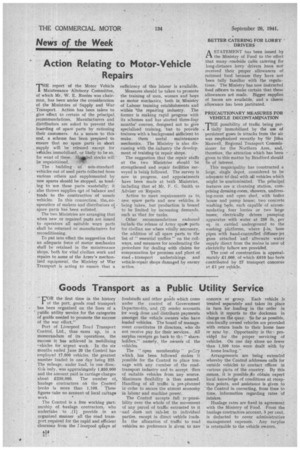Goods Transport as a Public Utility Service
Page 16

If you've noticed an error in this article please click here to report it so we can fix it.
" FOR the first time in the history of the port, .goods road transport has been organized on the lines of a rublic utility service for the categories of godds needed to promote the success of the war effort."
Port of Liverpool Road Transport Control, Ltd., thus sums up, in a memorandum of its operations, the success it has achieved in mobilizing "chides for urgent work. In the six months ended June 29 the Control has employed 17,000 vehicles, the greatest number loaded in one day being 325 The mileage, under load, in one directiois 'only, was approximately 1,850,000 and the amount paid in carriage charges about £250,000. The number of, haulage contractors on the Control books is more than 1,100. These figures take no account of local cartage work, The Control is a free working partnership of haulage contractors, who undertake to .(1) provide, in an organized manner all the road trans. port required for the rapid and efficient clearance from the Iiverpool qtrays of el 4
foodstuffs and other goods which come under the control of Government Departments., and (2) render accounts for work done and distribute payments amongst the vehicle owners who have loaded vehicles. The board of management constitutes 10 directors, who do not receive pay for their services. All surplus receipts go back to " shareholders," namely, the owners of the vehicles.
The "open membership " pay which has been followed makes it possible for the Control to place tonnage with any member of the roadtransport industry and to accept .ffers of suitable vehicles from any source. Maximum flexibility is thus assured. Handling of all traffic is pre-planned in order to secure the utmost economy in labour and machine power.
The Control accepts full re-ponsibility over the whole of the movement of any parcel of traffic entrusted to it and doe's not sub-let to individual parties, except in direct vehicle loads. In the allocation of traffic to road vehicles no preference is given to any
concern or group. Each vehicle is treated separately and takes its place in turn for loading in the order in which it reports to the dockman in charge on the quay. So far as possible, non-locally owned vehicles are provided with return loads to their home base or near by. Opportunity is the-, provided for the proper servicing of vehicles. On one day alone no fewer than 1,500 tons were dealt with by " home loading."
Arrangements are being extended whereby the Control addresses calls for outside vehicles to contact offices in various parts of the country. By this means, it is possible to obtain expert local, knowledge of conditions at reception points, and assistance is given to the Control in correcting, from time to time, information regarding rates • of intakes.
Haulage rates are fixed in agreement with the Ministry of Food. From the haulage contractors account, 5 per cent. is deducted to cover administrative management expenses. • Any surplus is returnable to the vehicle owners.




















































